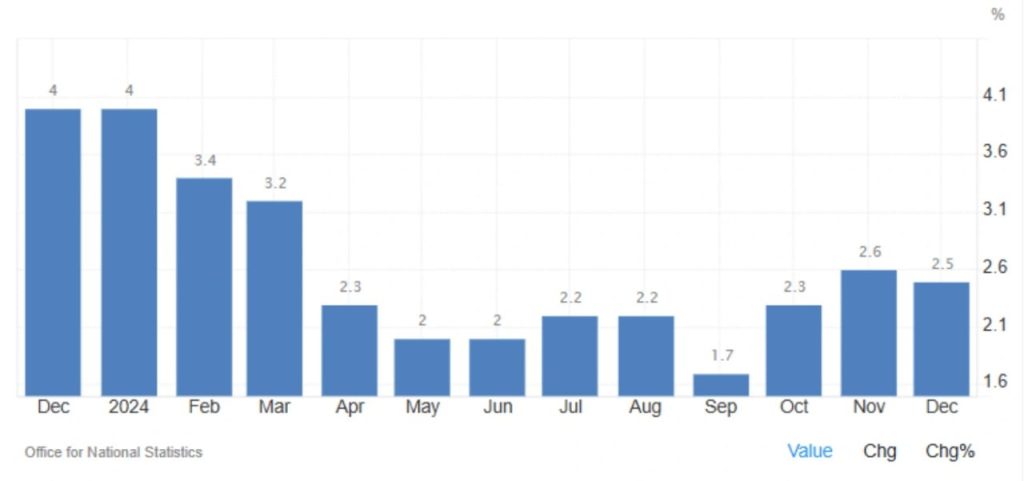
UK Annual Inflation Rate Drops to 2.5% in December 2024
UK Annual Inflation Rate unexpectedly dropped to 2.5% in December 2024, down from 2.6% in November. This figure came in lower than the forecasted 2.6% and closely aligned with the Bank of England’s (BoE) forecast made in early November. Despite the slight decline, inflation still reflects a more stable economic environment than in previous months, signaling that price pressures are starting to ease.

Slowdown in Key Sectors
Several key sectors saw a slowdown in inflation during December. The prices for restaurants and hotels, for example, dropped to 3.4%, the lowest level since July 2021, compared to 4% in November. This reduction was primarily driven by a 1.9% fall in hotel prices. Similarly, inflation for recreation and communication slowed to 3.4% from 3.6%, while services inflation eased to 4.4%, the lowest since March 2022, down from 5%. Food and non-alcoholic beverages saw steady inflation at 2%, indicating stable pricing for essential goods.
Transport and Housing Costs See Mixed Trends
Transport costs experienced a more muted decrease, with inflation at -0.6%, compared to -0.9% in November. This was partly due to upward pressures from motor fuels and second-hand cars, which rose by 1%, partially offsetting a significant drop in airfares (-26%). Meanwhile, housing and utility prices rose slightly more in December, with inflation increasing to 3.1% from 3% in November, reflecting a slight uptick in housing-related costs.
Read More: UK Consumer Confidence Index Drops
Core Inflation Continues to Decline
The core inflation rate, which excludes volatile items such as food and energy, also saw a decline. It dropped to 3.2% in December, down from 3.5% in November. The monthly rate of core inflation increased by 0.3%, which was below the expected 0.5%. These figures suggest that underlying inflationary pressures are continuing to ease, supporting the view that inflation is gradually returning to more manageable levels in the UK.
Share
Hot topics

Best broker for gold trading
There’s always been a certain magic about gold. Before online charts and trading applications, people stored their wealth in coins and bars, trusting that gold would retain its value during...
Read more




Submit comment
Your email address will not be published. Required fields are marked *